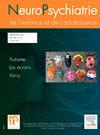L’alliance thérapeutique en situation transculturelle. Enquête auprès des psychiatres de l’enfant et de l’adolescent de la Haute-Garonne et perspectives
Q4 Medicine
Neuropsychiatrie de l''Enfance et de l''Adolescence
Pub Date : 2025-05-01
DOI:10.1016/j.neurenf.2024.11.004
引用次数: 0
Abstract
Background
The problem of the therapeutic alliance seems very present and specific in child psychiatry in a transcultural situation. The purpose of this article is to make an inventory of the practices and uses of child psychiatrists in Haute-Garonne when they are confronted with a lack of therapeutic alliance in a transcultural situation. Then, in a second step, to propose avenues for the evolution of practices based on the theoretical developments proposed by the transcultural current developed by Marie Rose Moro, with the aim of improving the therapeutic alliance and therefore the efficiency of care provided to migrant populations.
Method
Twenty-nine psychiatrists out of 58 responded to a questionnaire asking to describe, in a quantitative and qualitative way, the clinical practices with patients from first and second generation migration on the theme of the alliance, its identification, its remediation in the event of default, recourse to interpreters, recourse to specific transcultural or intercultural mechanisms, interest in transcultural concepts, as well as proposals for improving practices.
Results
The results show that the child psychiatrists of Haute-Garonne are generally aware of and interested in the concepts of transcultural psychiatry but that few of them use specific devices which are also few in the territory. The alliance problems encountered are not always related to the cultural particularities of the families. They do not always recognize the importance of interpreters in their functions as “cultural mediators” but more for the translation of the language. Many proposals are emerging to improve practices and resources in the territory.
Conclusions
From these results, avenues for development have emerged at several levels: adapting existing systems through better knowledge and taking into account the cultural specificities of patients, developing knowledge and the use of interpreting as well as to supervisions, set up new specific mechanisms (such as consultation and transcultural mediation) with trained practitioners and organize a network allowing greater clarity and better access to the resources of the territory.
跨文化背景下的治疗联盟。对上加隆地区儿童和青少年精神科医生的调查和前景
在跨文化情境下的儿童精神病学中,治疗联盟的问题似乎是非常现实和具体的。本文的目的是盘点上加隆儿童精神病学家在跨文化情况下缺乏治疗联盟时的实践和使用情况。然后,在第二步中,根据玛丽·罗斯·莫罗(Marie Rose Moro)提出的跨文化思潮的理论发展,提出实践发展的途径,目的是改善治疗联盟,从而提高向流动人口提供护理的效率。方法58名精神病医生中有29名回答了一份问卷,问卷要求以定量和定性的方式描述第一代和第二代移民患者关于联盟主题的临床实践,其识别,违约时的补救措施,求助于口译员,求助于特定的跨文化或跨文化机制,对跨文化概念的兴趣,以及改进实践的建议。结果上加隆省儿童精神科医生对跨文化精神病学的概念普遍了解和感兴趣,但很少使用特定的设备,这在该地区也是很少的。所遇到的联盟问题并不总是与家庭的文化特殊性有关。他们并不总是认识到口译员作为“文化调解人”的重要性,而是更多地认识到语言翻译的重要性。许多建议正在涌现,以改善香港的做法和资源。从这些结果中,发展途径在几个层面上出现:通过更好的知识和考虑到患者的文化特殊性来调整现有系统,发展知识和使用口译以及监督,与训练有素的从业者建立新的特定机制(如咨询和跨文化调解),并组织一个网络,使更清晰和更好地获取领土资源。
本文章由计算机程序翻译,如有差异,请以英文原文为准。
求助全文
约1分钟内获得全文
求助全文
来源期刊

Neuropsychiatrie de l''Enfance et de l''Adolescence
Medicine-Pediatrics, Perinatology and Child Health
CiteScore
0.60
自引率
0.00%
发文量
61
期刊介绍:
Organ of the Société française de psychiatrie de enfant et de adolescent, Neuropsychiatrie de enfance et de adolescence tackles all fields of child-adolescent psychiatry and offers a link between field and clinical work. As a reference and training tool for students and practitioners, the journal publishes original papers in child psychiatry as well as book reviews and conference reports. Each issue also offers a calendar of the main events dealing with the speciality.
 求助内容:
求助内容: 应助结果提醒方式:
应助结果提醒方式:


